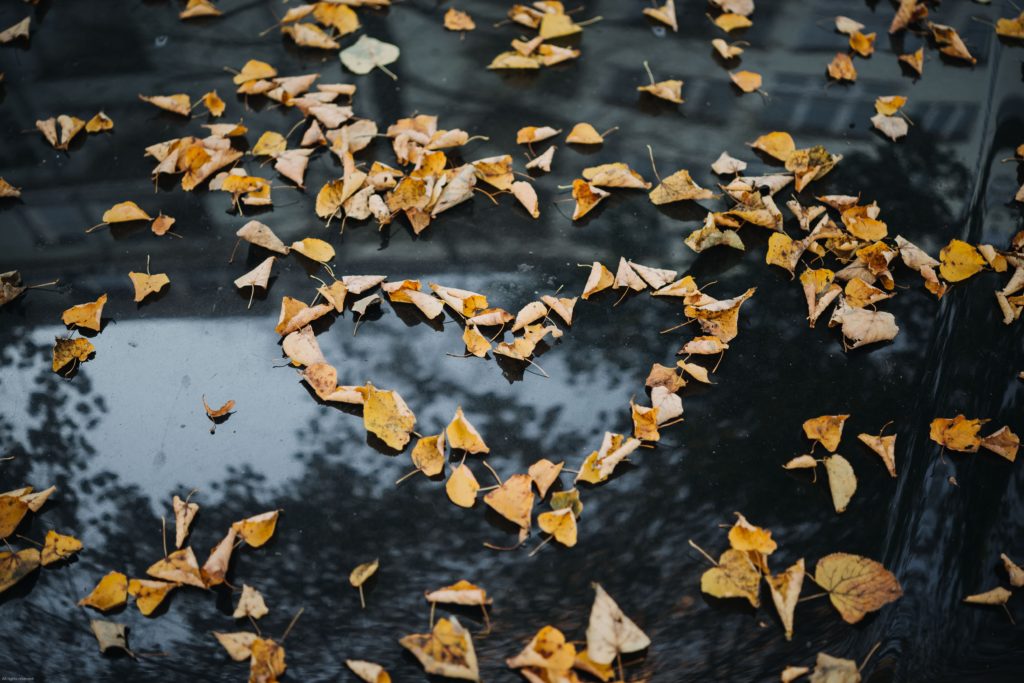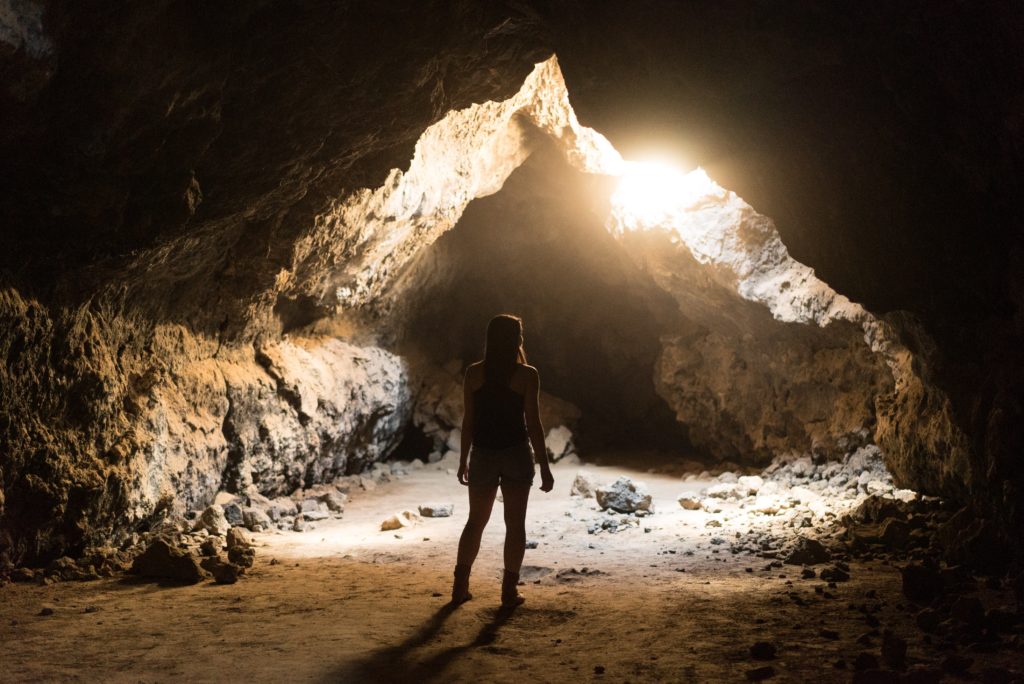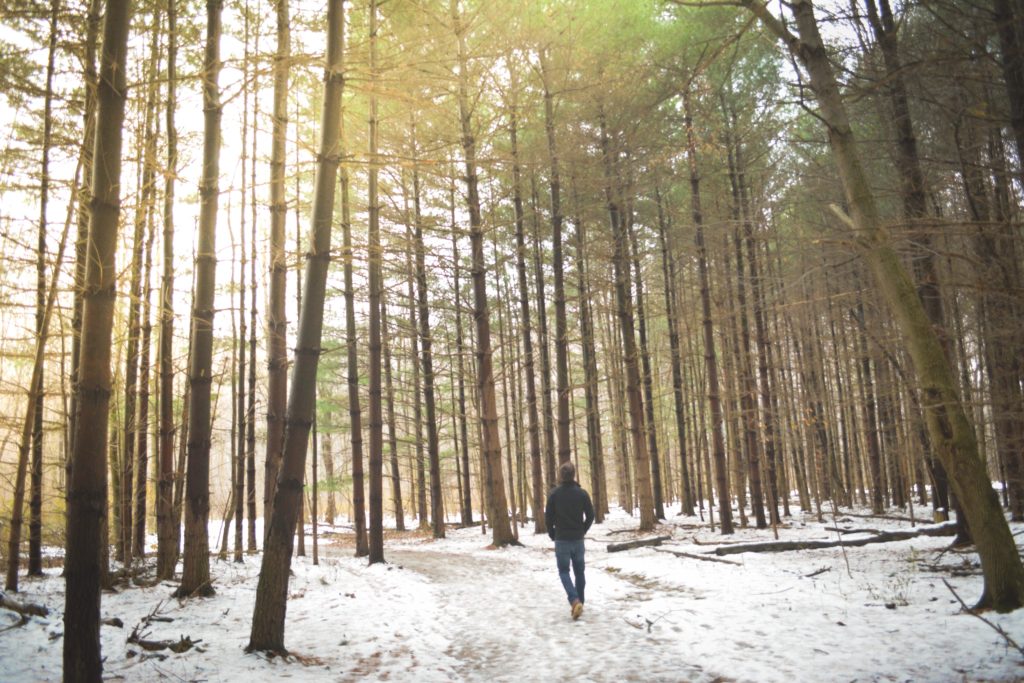The other week I wrote that all any part of me wants is love and presence. Ever since I said, “I love you” to my fearful part, it’s as if I triggered a rock slide, and now other parts are popping up and saying, “What about me? Do you love me, too?”
The practice is a difficult one because so much of my life has been geared toward fighting, toward struggling, to talking back. For instance, if I think I’m fat, my response will be, “No you’re not.” I don’t allow for the thought to even exist. Since the other week though and learning to love a part I previously only pushed away, instead of fighting back, I’m saying, “OK Rebekah. So what if you are? I love your body no matter what. If it’s fat, if it’s thin, if it’s not functioning the way you want it to, I love it, and you anyway.”
I feel vulnerable even typing that because it’s true, what I long for is unconditional love and I’ve withheld it from myself in a never-ending quest toward an unattainable ideal. I think there’s also a fear if I shower myself with unconditional love that I’ll become an inert blob, but the truth is, love doesn’t mean constant indulgence. Love means compassion, understanding, acceptance, allowance. It means saying to myself, “I see you as you are, right now, and I love you anyway.” From that place, real change and transformation occurs. Loving my fearful part didn’t make me more afraid, quite the opposite. Loving my fearful part gave me a sense of relief and peace unlike any I’ve experienced before.

Can I love it all? I’m working on it. Photo by Roman Kraft on Unsplash.
My spiritual practice promotes the cultivation of love. Of viewing everything as an expression of an infinite loving consciousness, of trying to grow the internal feeling of love. Our goal is to love all living beings and to merge ourselves in the source of that feeling. To swim in an ocean of love. The thing is though, if I keep believing some parts of me are not worthy and deserving of love, there’s no way I can give myself over to that ocean. It’s like saying, “Your legs are allowed to wade into the water, but your arms have to stay dry.” I can’t experience complete merger until I’m completely submerged.
What I’m coming to here is recognizing, again, all parts of me want love. My body wants love, my mind wants love, my emotions want love. The cool thing is I can give that to myself. I don’t have to wait for some imagined future that may never come. I don’t have to wait for someone else to come along and say, “I love all parts of you unconditionally.”
If you had asked me five years ago whether I loved myself, I would have said yes because I said affirmations and treated myself with kindness. I checked all the boxes people listed when they spoke of self-love. Now though I’ve reached a new level of love because it’s not just looking in the mirror and saying I love you. It’s saying I love you to the part of me that says mean things. It’s saying I love you to the part of me that’s disappointed. It’s saying I love you to everything, regardless of my judgment of the part. Now the answer to the question, “Do you love me, too?” is “Yes.”
I dream of a world where we love all parts of ourselves, even the parts we don’t particularly like. A world where we recognize every part is worthy and deserving of love. A world where we work toward loving ourselves unconditionally.
Another world is not only possible, it’s probable.
Fear is an interesting emotion. In our society, we treat it like a plague – something to cure, attack, avoid. We say, “Screw fear,” or, “Don’t let fear get in the way.” Oftentimes our message about fear is simpler: “Don’t be scared,” as if telling someone to stop being scared could stop them.
In my own relationship with fear, I’ve also treated it like an annoying inconvenience, or an enemy to defeat. For many years I used food to anesthetize myself. Or I escaped into fantasy, books, movies, television. When I realized none of those things would fix my fear, I started using other methods like affirmations, tapping, visualization, etc. Basically, whatever I could do to not feel afraid, I did. And every time I realized fear hadn’t left, I felt discouraged, disappointed, as if I’d failed. As if fear had won and thus I’d lost.

We must enter the cave that we fear. Photo by Joshua Sortino on Unsplash.
The other week, intense fear reared its head in response to the fires north of me. I could see smoke drifting into San Francisco and some days it wafted into Oakland as well, creating a preternatural calm, a sun so hazy and orange I could look at it directly. Fear came up for many reasons, one of them an acute sense of powerlessness. I bought a mask to protect my lungs from the smoke, but I couldn’t control whether the air remained smoky.
In my therapy session, I noticed I wanted my therapist to fix and solve my fear. I wanted him to take it away from me, to make it better. Instead he suggested I sit with it. I’m not sure what happened in the session because days prior I tried the same thing and just couldn’t, but during the session I finally stayed still. I let fear wash over me saying, “It’s OK. It’s OK that you feel afraid. It makes sense. It’s understandable.” For two days, fear erupted from me like a volcano, not due to any thoughts in particular, rather the feeling of fear itself. My heart palpitated, my breathing quickened. I tried all my usual tricks to no avail until I again said, “OK. I’m here with you. I won’t leave you alone with your fear.” And then at group meditation last week I said to my fearful part, “Not only is it OK that you’re here, but also, I love you,” and that brought on the tears.
All every part of me wants is love and presence. I can’t ditch fear and anxiety. As a human being I will inevitably feel scared and anxious again, but since I said, “I love you” to my fearful part, I feel fearless. Not because I’m without fear, but rather because I know when fear pops up again, I’ll allow it, I’ll sit with it, and I’ll say I love you. And then the fear will pass like a storm cloud.
My spiritual teacher says if a person takes shelter in the divine, one need not be afraid of anything. He says, “[F]ear requires two entities for its expression – the one who fears and the cause of fear. Where there is only One entity, because there can be no cause, fear cannot exist.”
In the past, I would have taken that to mean I’m not meditating enough because I still have fears. For today at least, I’m recognizing by loving my fearful self, I am taking shelter in the Cosmic Consciousness. I’m recognizing this fear, too, is a part of me, a part of God, and the way to dissolve fear is by showering it with love.
I dream of a world where we treat our fearful selves with love. A world where we recognize we are not at war with fear, but rather fear is like a small child, begging for affection. A world where we embrace our fearful parts, give it as much love as possible, and in that way become fearless.
Another world is not only possible, it’s probable.
Recently I watched an interview with Megan Phelps-Roper, formerly of the Westboro Baptist Church. Westboro Baptist Church is the one that protests funerals, that proclaims Jesus hates gay people, that calls Jews, Jesus killers. Megan’s grandpa founded the church so you could say she was steeped in indoctrination. Through interactions over Twitter, she completely reversed her opinions and now spends time with people she used to hate.
Watching her interview moved me, not only because her story is touching, but also because of her humility. It oozed from her. No longer self-righteous and arrogant, Megan instead recognizes she doesn’t have all the answers, and furthermore that her previous behavior was wrong.

I’m striving to be as humble as a blade of grass. Photo by Chang Qing on Unsplash.
Watching Megan I was reminded of the power of humility. She is able to touch other people, to change them on a deep level, because she doesn’t walk around like a proud peacock proclaiming her glory. I have to admit, humility is a tough one for me. I want to be the best! I want to be number one! I want fame and critical acclaim. If I do something well, I want heaps of praise for it. Give me my gold medal please, thanks. However, I also recognize arrogance only serves my ego, only puffs me up, and is not in service of a power greater than myself.
When we say someone is arrogant, we’ll say they’re full of themselves. Exactly, full of themselves. There’s no room for anyone else or anything else.
My spiritual teacher says one should be as humble as the grass because it bows before everyone and doesn’t pick and choose who to bend for. Why though? Why would he say that? In my opinion, I think it’s because when we’re proud, when we’re self-aggrandizing, we only think of ourselves, and we start setting ourselves apart from everyone else. We’re better than someone else. People are winners and losers instead of fellow human beings. In that sense, pride creates disconnection from others, but I also think it creates disconnection from the divine. If I want to be an instrument for my higher power, there’s no way I can do that if I constantly think I know what’s best. There’s no way I can be an instrument if I’m puffed up on my own self-importance because again, no room exists for anything else.
I often think in order to do anything worthwhile it must be big and grand. I need to be a bestselling author, I need to be a billionaire philanthropist, I need to cure cancer. Megan’s interview reminds me it’s the small actions that are the most powerful sometimes. There’s a joke I heard that says, “What’s the most dangerous animal to humans?” You would think it’s a shark or something, but no, it’s a mosquito. I know a mosquito is an insect and not really an animal, but the point is still valid. A mosquito has the potential to be far deadlier than a shark because of all the diseases it carries. Similarly, perhaps my small actions have more potential than I know.
I dream of a world where we understand the power of humility. A world where we recognize we are one among many, neither better nor worse. A world where we realize humility makes us instruments, allowing for connection among our peers and our higher power. A world where we remember small can be great.
Another world is not only possible, it’s probable.
What a week. Lots of grief on a societal level, but also a personal one. I’m reminded of how human we are. Of how we’re all in this together. As Ram Dass says, “We’re all just walking each other home.”
His quote kept ringing through my head this week. In times of trauma and grief, I want to do something. Sometimes there are actions to take, but sometimes all we can do is hold each other while we cry.
With painful feelings, I’ve often wanted someone else to take them away. To siphon them off as they would drink the last of a milkshake. I wanted someone, anyone, to make me feel better. Speaking as someone with loads of experience trying to escape her feelings, I can say without a doubt the answer is “That’s not possible.” No one else can cry my tears for me. No one else can take away my pain. Other people and things may distract me for a while, but just as with storm clouds, they darken the sky whether I acknowledge them or not.

Walk with me? Photo by Hannah Donze on Unsplash.
Ram Dass’ quote reminds me no one is supposed to take away my pain and sorrow because we are all humans. We are not machines. We can’t write a code that says, “We will never feel sad ever.” Furthermore, it’s no one’s responsibility to make me feel better. We are fellow companions on this path. We are pilgrims going on a pilgrimage. There may be times I sprain my ankle and have to rely on others for help, but the responsibility for forward motion is still mine, and the responsibility to move through my emotions is still mine.
My spiritual teacher says, “[A] true society is like a group of pilgrims who attain a deep psychic affinity while traveling together, which helps them solve all the problems in their individual and social lives.”
That’s us. A group of pilgrims traveling this rocky path together. I’m speaking in metaphors a lot in this post, but what I’m trying to get at is it’s not my responsibility to solve or fix someone’s emotional state, or vice versa. I don’t have all the answers, or any of the answers, really. I can’t tell a person how to live their life or what they should do to feel better. All I can do is say, “I hear you and I’m beside you. I’m walking this path with you as a companion.” And that’s it. We’ll address problems as they arise – blisters, sprained ankles, etc. – but the emotional states? I’ll be with you during them, but the tears are still yours to cry and the steps are still yours to walk. And maybe that’s enough.
I dream of a world where we recognize we are all pilgrims on a pilgrimage. A world where we sit with each other when we’re in pain. A world where we realize all we can do is be there for each other. A world where we remember we’re all just walking each other home.
Another world is not only possible, it’s probable.
This week I experienced a breakthrough around impatience. Normally when I’m impatient, I roll my eyes and say, “Oh look. This again.” Or I stew in my impatience, allowing myself to feel all the irritation and frustration. When impatience bubbled up for me recently, instead I became curious. “Why am I impatient? What’s going on here? Are there other things at play?” Perhaps unsurprisingly, the answer is, “Yes.”
When I’m impatient, two other forces are at work. The first is scarcity – I think there’s not enough of whatever it is. If I’m waiting in line and feeling impatient, it’s because I feel pressed for time, for example. The second force at play is a lack of perspective. My career is a great example. I want to be a bestselling author, I want to touch a lot of people on a grand scale, to serve others in a big way using my words. Impatience comes in because I think if I’m not doing those things right now, I won’t ever do them. I get caught in the present moment in a bad way. A friend told me when her daughter skins her knee she’ll exclaim, “My knee hurts and it’s always hurt and it will always hurt!” When I’m impatient, I act like that.

There are multiple forces associated with impatience. Photo by Igor Ovsyannykov on Unsplash.
This week when impatience presented itself I asked, “What if most of my dreams will come true later? Is it possible they’re in my future?” and I felt better. As I’ve seen over and over again, for better or for worse, I have no idea what the future holds, so yeah, it’s possible I can still have what I want, just not right now. Furthermore, I have a lot of life left, I hope. I likely won’t drop dead in the next 30 seconds so maybe down the road the things I want will happen. What helps me here is thinking about past experiences. For many years I wanted to visit Italy. Every time someone mentioned Italy or shared pictures of their travels, envy and impatience overtook me. “I want to go to Italy too! Why hasn’t it happened for me?” And then in 2012, I finally visited the country in a grace-filled way better than I could have imagined. My dream did come true, but it took a while.
My spiritual teacher says that “whatever happens in this universe of ours is nothing but an expression of Cosmic desire or Cosmic will … when a human desire and His desire coincide, then only does the human desire become fruitful, otherwise it is a sure failure.”
That means when I align my desire and higher power’s desire, dreams come true. It also means when I’m impatient, I don’t recognize life is a long game, I hope. When I’m impatient, I’m thinking in terms of instant gratification as opposed to syncing my will with the divine’s. It also means I’m not recognizing the natural rhythm of life. The environment has seasons and so does life. In the dead of winter it’s tempting to believe spring will never arrive, but it always does, when the temperatures rise, when the snow melts, when the sun shines brighter. Dreams are like that too – they blossom when the environment is ideal. When I’m impatient it’s like going outside in 3 feet of snow asking, “Why aren’t the tulips in bloom?” They will bloom, but I have to wait, and that means patience.
I dream of a world where we realize everything takes time and just because something hasn’t happened yet, doesn’t mean it won’t. A world where we remember just like Earth, our lives and our dreams also have seasons. A world where we maintain perspective about the future and practice patience.
Another world is not only possible, it’s probable.